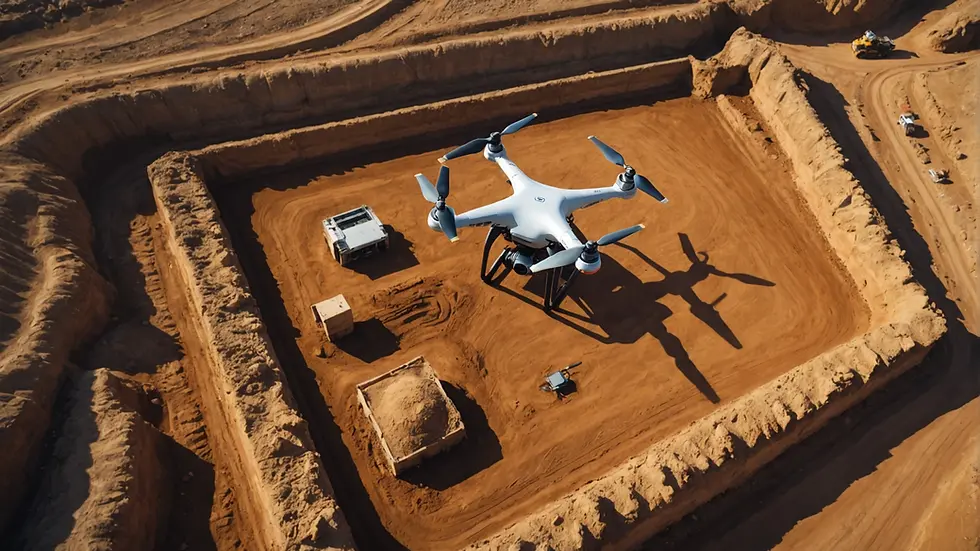How is Smart Tech Reshaping Excavation Methods and Techniques?
- PT PEP
- Nov 3, 2024
- 3 min read
In today's fast-paced construction landscape, smart technology is changing the game in the excavation industry. This transformation is not just about making processes quicker; it also significantly improves safety and promotes environmental responsibility. This article delves into how smart tech is redefining excavation techniques, highlighting key technologies and their profound impacts on the field.
The Rise of Smart Technology
Smart technology has become central to our daily lives, and the excavation industry is no exception. By harnessing data analysis, Internet of Things (IoT) devices, and automation, smart tech simplifies what used to be labor-intensive processes.
For example, a report by McKinsey noted that the construction sector could see a productivity increase of up to 15% through digitalization. This shift towards technology is making excavation projects not only more efficient but also less costly, with significant gains in organization and execution. From drones that conduct aerial surveys to advanced software systems managing projects, smart tech is reshaping how excavation is performed.
Drones and Aerial Imaging
Drones represent a significant innovation in excavation, offering exceptional aerial imaging capabilities. They can survey vast areas with striking accuracy, producing high-resolution images and topographic maps much faster than traditional methods.
The advantages of using drones are clear:
Time Efficiency: Drones can cover areas up to 100 acres in less than an hour, while manually surveying the same space could take days.
Cost Reduction: Drones can reduce surveying costs by up to 70% by cutting down on manpower and equipment needs.
Data Collection: Drones provide real-time data, allowing for quick adjustments to project plans based on immediate findings.

GPS and Machine Control
Recent advancements in GPS technology and machine control are further enhancing excavation practices. Modern GPS devices allow operators to fine-tune excavations to specific depths and angles with impressive accuracy.
Machine control systems streamline this process by integrating with GPS, guiding heavy machinery precisely. The benefits include:
Increased Accuracy: Excavators can achieve grade specifications with up to 97% accuracy, minimizing costly errors in excavation.
Reduced Material Waste: Accurate excavations can cut material waste by as much as 20%, leading to savings on both costs and environmental impact.
Improved Safety: Automating machine guidance reduces human errors, greatly enhancing safety on-site.
Real-Time Data Analytics
Smart technology enables real-time data analytics, allowing excavation teams to monitor crucial parameters like equipment performance, resource usage, and environmental conditions.
This data is instrumental for informed decision-making. Key benefits include:
Predictive Maintenance: By analyzing equipment data, operators can foresee maintenance needs and reduce breakdowns by up to 30%, cutting downtime significantly.
Enhanced Project Tracking: Real-time updates enhance accountability among team members and keep stakeholders informed of project progression continuously.
Resource Optimization: Analyzing data helps allocate resources more efficiently, ensuring projects stay on schedule and within budget.
Remote Operations and Automation
The shift towards remote operations and automated equipment represents a major change in excavation. Remote-controlled excavators minimize the need for on-site labor while maximizing operational efficiency.
The advantages of these technologies are substantial:
Safety: Operators control excavators from safe distances, significantly reducing the risks associated with hazardous sites.
Convenience: Automated machines can work around the clock, boosting productivity without the fatigue that human laborers experience.
Skill Utilization: Complex machine operations become accessible; skilled operators can focus on overseeing multiple machines instead of being tied to a single one.
Sustainability in Excavation
Smart technology does more than improve efficiency; it also fosters sustainable practices in excavation. These advancements help mitigate environmental impacts in a few key ways:
Waste Reduction: More precise excavation techniques lead to less soil being disturbed, which helps safeguard local ecosystems.
Energy Efficiency: Many new machines consume up to 25% less fuel, reducing the overall carbon footprint of excavation projects.
Recycling and Reusing Materials: Smart systems can analyze data to identify opportunities for reusing excavated materials, supporting eco-conscious project goals.
The Future of Excavation
Looking ahead, the integration of smart technologies in excavation will likely continue to expand. Emerging trends signal a more connected and efficient future for the industry:
5G Technology: The rollout of 5G will enhance data transmission speeds, allowing for improved responsiveness in remote-operated machinery.
AI and Machine Learning: Artificial intelligence may revolutionize decision-making processes, using data patterns to predict challenges and streamline operations.
Augmented Reality: Augmented reality can give operators real-time visual aids, enhancing operational accuracy and planning effectiveness.
Embracing Smart Technology
Smart technology is fundamentally changing excavation practices, ushering in improvements in efficiency, accuracy, safety, and sustainability. As these innovations develop, they will not only transform the excavation landscape but also promote a more responsible approach to construction.
By adopting these advancements, excavation professionals can lead the charge in creating more effective and environmentally friendly practices. Staying ahead in this tech-driven era will ensure that projects are not just successful but also aligned with the growing demand for sustainable development in the construction industry.


Comments